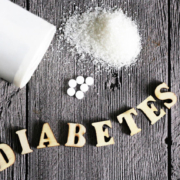Dr. Chet’s Health Memos
 If it’s in the health news today, I’ll be writing about it as soon as I read the research, both old and new. With my email Health Memos, you’ll know more about making lifestyle choices that will help you get and keep good health. These free, concise updates on health are emailed to subscribers twice a week. Subscribe today and get a free MP3, in English or Spanish, of Dr. Chet’s Top Ten Tips—Small Changes for a Healthier Life.
If it’s in the health news today, I’ll be writing about it as soon as I read the research, both old and new. With my email Health Memos, you’ll know more about making lifestyle choices that will help you get and keep good health. These free, concise updates on health are emailed to subscribers twice a week. Subscribe today and get a free MP3, in English or Spanish, of Dr. Chet’s Top Ten Tips—Small Changes for a Healthier Life.
Sugar vs. Sweetener Research: Meaningless in the Real World
I’m in a slight disadvantage in evaluating this study; I was able to read only the convention-session abstract and the press release. There were no recordings of the presentation that I could find, so there are details I don’t know. I have questions about the process, not the results, so here are my thoughts. The […]
What They Got Right in the Sugar and Artificial Sweetener Research
Whether it’s a new form of treatment, a new medication, or even examining a phytonutrient for potential benefits, it all starts with basic research. That’s what the study I began talking about Tuesday is all about: basic research. I like it because this is the way all research has to begin. This is where test-tube […]
Artificial Sweeteners, Obesity, and Diabetes
Last week, you may have seen headlines that said something like “Artificial Sweeteners May Cause Obesity and Type 2 Diabetes!” Just about every news organization picked up a press release from the Experimental Biology meeting. In the press release, researchers gave some of the results of a paper that was presented at a scientific session, […]
“My Doctor Told Me”
I get asked health questions all the time about weight loss, fitness, diet, and more. If a physician told the questioners something they should or should not do, they will let me know, and then I know my job just got harder. That’s why “my doctor told me” are four of the most powerful words […]
Physicians as Teachers
As the interview in JAMA continued, Dr. Devries continued talking about the lack of training and why it was a problem in his mind. He cited a study published in 2013 by the U.S. Burden of Disease Collaborators which concluded that the leading risk factor for degenerative disease and mortality was a poor diet. A […]
A Doctor’s Nutrition Training
“Essentially zero.” That’s the answer a physician gave in an interview when asked how much nutrition he received in medical school. The lack of substantive training continued all through his internal medicine residency and specialty training. His expertise? Cardiology. What’s worse is that he said that nothing has changed since. The interview with Dr. Stephen […]
Yum, It’s Fiber Soup!
Every day, I put a combination of psyllium fiber, inulin fiber, and a probiotic into a glass, add water, stir it up, and drink it down. Then I follow it with another glass of water to make sure the fiber doesn’t have to draw fluids from my gut. That gives me around six grams of […]
Giving Up Those Pointless Battles
Every morning you can hear a “boink” on one of the back windows of the house. Every 15 seconds or so, another one. Then it begins to travel to another window. Boink. Boink. Boink. It’s a female cardinal. Time after time after time. Day after day. Upstairs windows, downstairs windows; the back of our house […]
Your Payment Is Due
Today is Tax Day here in the U.S.—if you owe the government any money, today is the day you have to file your taxes and pay up. There are penalties if you’re late, so you want to be sure you pay up on time. Good health is the same way. The things you do that […]
It’s All in the Dash
In this Memo, we’re going to pretend the survey’s treatment options for high blood pressure are real. The choices were a pill, a cup of tea, exercise, and an injection once a month. If they were real, which one might be the best option for you? To me, it all comes down to The Dash. […]










